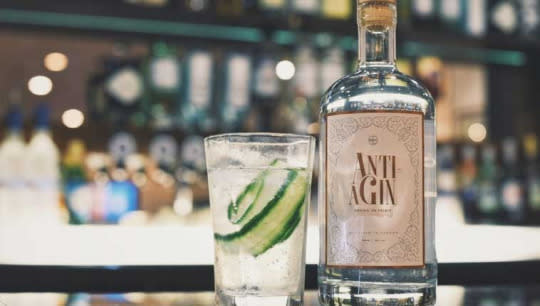This Anti-Aging, Collagen Infused Gin Probably Doesn’t Work

Photo: Larry Marano/Getty Images
Some things are hard to give up, no matter what you read. A few minutes in the sunshine will age you as many years, they say, but doesn’t that heat feel amazing? You’ve heard that a couple cocktails a week means your wrinkles will be getting in line (not in the good way) but that frosty margarita is so relaxing.
What if there was something that cut the guilt factor, just a little? What if that cocktail actually added back a few years? Anti-aGin, a gin produced by hotel chain Warner Leisure and partner Bompas & Parr, promises that “it’s the alcoholic equivalent of a facial.” The gin is chock full of anti-aging botanicals and drinkable collagen—they say it also fights cellulite.
This new Anti-aGin is 40-proof and formulated with drinkable collagen, nettle, witch hazel, chamomile (a blend that is supposed to both reduce inflammation and rejuvenate cells), gotu kola, which claims to combat cellulite and inhibit scar formation, burdock (believed to repair cracked skin), and green tea (a detoxifier). And because it’s still gin, it contains juniper, coriander, and angelica root. Oh, and alcohol.
Drinkable collagen is no new thing (and we are big proponents of bone broth). It started in Asia with companies like Shiseido and Kinbi selling collagen supplements in mini bottles, and those supplements soon appeared in US markets. But now we’re starting to see the same thing happening to alcohol: last year Japanese alcohol distributor Suntory launched a collagen beer called “Precious”, targeting women. Read this article to get our experts’ take.

Does it work? There are studies that found taking collagen helps increase skin density and hydration, like this one, from 2015. But as you’d expect, doctors are hesitant to recommend drinking alcohol as a cure for anything, least of all aging. Doctor’s also remain skeptical on collagen supplements. Charlotte’s Book Expert Dermatologist Marnie Nussbaum gave us her opinion:”When collagen gets into your digestive system, it gets broken down,” she says, “There is no real evidence that it then goes from your bloodstream to your skin. Collagen is a protein, and your body cannot tell the difference between proteins.”
“Basically, when you drink to someone’s health you’re not drinking to your own,” says Dr. Tyler Hollmig, dermatologist and director of Laser and Aesthetic Dermatology at Stanford Health Care. “Alcohol is known to dehydrate the skin and to induce hormones that may make the skin more red and irritable. Also, it is unclear how much collagen is absorbed and transmitted to the skin.”
This new Anti-aGin probably isn’t equivalent to a facial, but is it better than drinking regular gin? Maybe. If you’re gonna reach for a drink, a little extra botanical boost and collagen kick might be a good thing. The only thing that seems certain is an emerging trend for “healthier” alcohols targeted at women—a trend we’ll be following.
MORE FROM CHARLOTTESBOOK.COM:
Shakira’s Trainer On Anti-Aging Fitness

